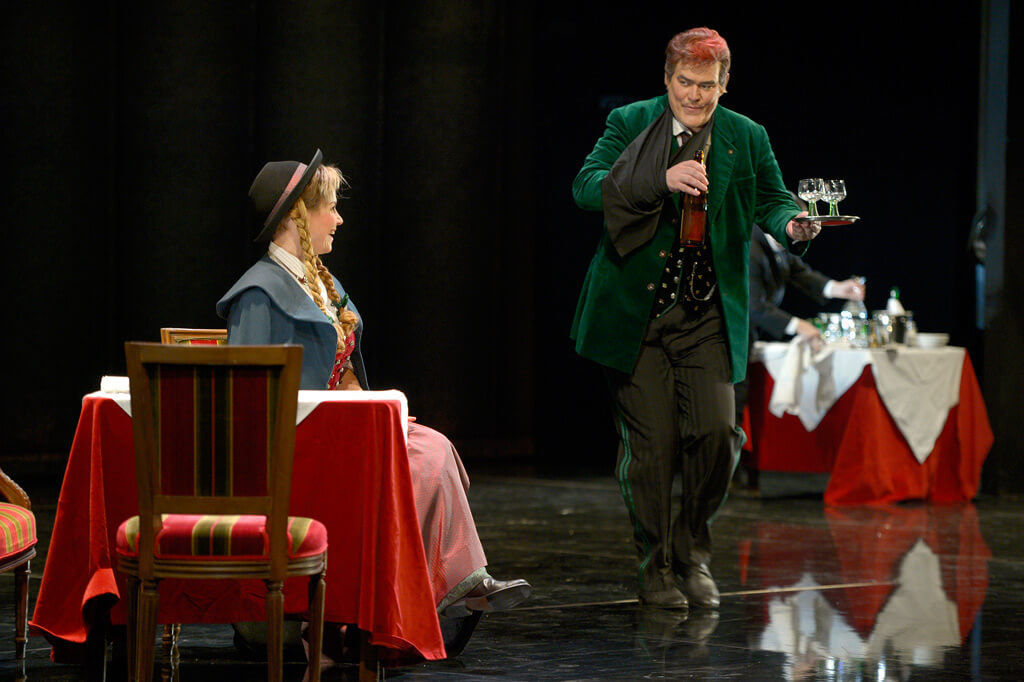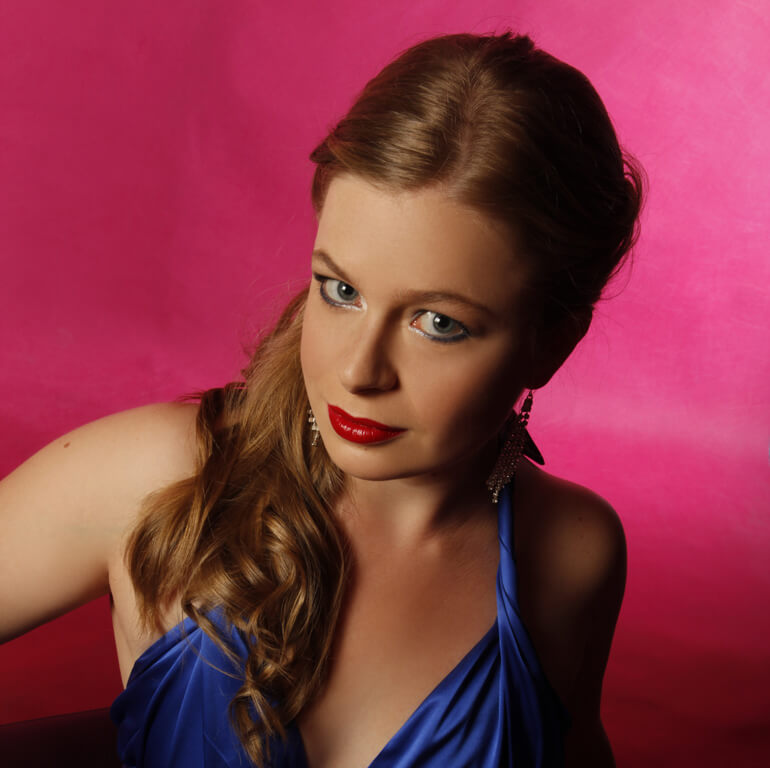Third and final installment of the report from Deutsche Oper Richard Strauss-Woche

Well, all good things must come to an end. I’ve had a great week of Richard Strauss opera performances here at the Deutsche Oper. Tonight was Der Rosenkavalier, arguably the one work that defines Richard Strauss the opera composer. I saw my first live opera way back in January 1967. A green undergraduate, I was attracted to the “oom-pah-pah” Italian warhorses, not knowledgeable or sophisticated enough to appreciate Wagner or Strauss. I remember listening to a Met broadcast of Die Frau ohne Schatten around that time and couldn’t make heads or tails out of it – the story was just too cryptic for me, the orchestration too dense, and the singers sounded like they were yelling at each other. Well, I was naïve…
My first live Strauss opera, albeit in concert, was Elektra, around 1972 at Severance Hall in Cleveland. I never forgot Ursula Schroeder-Feinen (Elektra) and Roberta Knie (Chrysothemis), both with incredibly penetrating voices. I don’t remember anyone else in the cast, except maybe Kenneth Riegel who might have been Aegisth. The conductor was Christoph von Dohnanyi. I don’t really know why but I was just blown away. By then I was a doctoral student and hopefully smarter and more discerning in my musical tastes, a-hem… After that experience, I started going to Strauss operas, mainly Der Rosenkavalier, Salome, and Ariadne auf Naxos, and eventually all the other ones except for Guntram, Feuersnot, Die Liebe der Danae and Friedenstag. Now I can cross Die Liebe off my list of unseen, staged, Strauss!

According to the statistics of the most recent five seasons of opera performances worldwide (2009/10 to 2013/14), Strauss is No. 9 among the most frequently performed opera composers. For the sake of comparison, the top five are Verdi, Mozart, Puccini, Wagner, and Rossini in that order. But Strauss is ahead of Tchaikovsky, Johann Strauss, Bellini, Massenet, and Gounod. Salome is the most frequently performed at 566 performances, with Rosenkavalier at 515 a close second. Given I’m now a Strauss fan, this trip is a must. But wouldn’t it be great if we could have had all fifteen… okay I’m greedy!
Der Rosenkavalier was the last to be presented at the Strauss-Woche. I was so looking forward to hearing once again the Marschallin of Anja Harteros, whom I have seen with some regularity in Munich. She’s arguably the biggest “star” among German sopranos today. Sadly she cancelled, the third time I attended a performance of hers in which she didn’t show. Singers are human and there are all sorts of reasons, health or otherwise, that can lead to a cancellation. I hope I’ll be lucky enough to catch her in Munich this summer, when she’s slated for Tosca and Der Rosenkavalier.
But you know, I can’t say I was deprived. Her replacement, German soprano Michaela Kaune, was wonderful — warm, feminine, sincere, free of archness and artifice. The beginning of Act One up to the levée scene, she was youthful, sexy, playful in the long scene with Octavian. In the levée, she became more formal, distant, and remote. When she sang “Mein lieber Hippolyte, Heut haben Sie ein altes Weib aus mir gemacht,” the transformation was amazing. With her hair up, no makeup, all of a sudden, her body and face seemed to undergo a change – she did look like an ‘Alte Frau!’ Although the Marschallin is only supposed to be 33 or so, but in those days, she was old. Vocally Kaune may not have the opulence and the volume of Harteros, and in the Final Trio, she was underpowered — her high B that took over from Sophie didn’t make much impact. But I loved the quality of her sound, with its caressing mezza voce, her nuanced expression, her articulation of the text in the monologue, all absolutely first-rate.
Physically Kaune is also very beautiful and she has great chemistry with the Octavian of Daniela Sindram, who, together with Elin Garanca and Sophie Koch, are three of the best Octavians today. To my eyes and ears, Sindram is the best. The love-making between the Marschallin and Octavian is very naturally staged here by Friedrich, but by North American sensibilities, perhaps it would be considered a little risqué. I’ve heard Sindram a number of times in Munich where she’s in the ensemble. Her Komponist in Ariadne is amazing — you won’t find a more believable singer in a trouser role, and her high mezzo is among the most beautiful.

Australian Siobhan Stagg sang a lovely Sophie tonight. In the Presentation of the Rose, her voice blended beautifully with Sindram’s. She also looked good on stage, her Sophie has just the right mix of spunkiness and girlish charm. If I were to nitpick, I would have liked a truer high pianissimo, and I did notice that she broke the phrase, took a big breath to go up to the high C sharp. But these are minor quibbles. The Ochs was Austrian bass Albert Pesendorfer, formerly at the Staatsoper Hannover and now a member of the Deutsche Oper Ensemble. A wonderfully singer, coupled with an imposing physical presence, just the right ingredients for Ochs. His Waltz in Act Two was very nicely done, opposite the fine Annina of Stephanie Lauricella. His is a youthful Ochs, thankfully not crude or boorish, but with just enough little touches that one notices the difference in social station between him and the Marschallin.
The supporting roles were all strongly taken. I particularly liked the youthful, handsome and sturdily sung Faninal of Michael Kupfer, a fine baritone who actually sings Sachs, Wolfram and other major roles, so this is luxury casting. The Italian Singer was young American tenor Matthew Newlin, another member of the Ensemble. His solid top in “Di rigori amato” was a pleasure. The orchestra was marvelous all week and tonight was no exception under the baton of the underrated conductor Ulf Schirmer. This band must have played this piece a zillion times, but to my surprise, according to the program, this was only the 75th performance of the famous Götz Friedrich production since its debut in 1993. So in 23 seasons, it works out to only a bit more than 3 performances a year, which isn’t a whole lot when you think Rosenkavalier is a real staple of German houses.
Instead of Marie-Therese’s time, Friedrich has updated it to the composer’s time, roughly the 1920’s judging by the costumes. I liked a lot (though not all) of it. The unique staging of Act 3 Scene 1, set in the backstage of a dinner theatre, is really novel and interesting, preferable to some drab, seedy inn one encounters in lots of productions of this piece. Act 2 looks a bit like a combination fancy hotel lobby restaurant instead of Faninal’s townhouse. Act 1 is the least successful, basically a bare stage with a bed and a few props, with a big curtain upstage hiding a lot of unsolved set design issues. But ultimately the musical values of this show was so high that the rest didn’t really matter. There’s something to be said about experiencing Strauss in a German “A” House. Highly recommended.
See here for Part I and Part II of Joseph So’s Letters From Berlin.
#LUDWIGVAN
Get our exclusive newsletter here and follow us on Facebook for all the latest.



